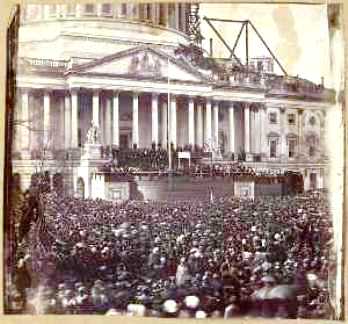At the end of July, before two political conventions and, I’ve lost count of how many negative campaign ads and divisive comments about the current state of our Union, I wrote how Abraham Lincoln, on March 4, 1861, stood on the steps of a U.S. Capitol building still under construction and spoke words of reconciliation and hope.

Lincoln was so hated by Southern separatists that death threats against him poured in prior to his inauguration. The eminent newspaper editor Horace Greeley sat behind Lincoln that day, “expecting to hear its delivery arrested by the crack of a rifle aimed at his heart, but it pleased God to postpone the deed, though there was forty times the reason for shooting him in 1860 than there was in ’65, and at least forty times as many intent on killing or having him killed. No shot was then fired, however; for his hour had not yet come.”
In re-reading Lincoln’s inaugural that he addressed to all, but mostly those Southern states, I kept thinking, what a formidable challenge: to reunite the Union and avoid civil war.
“We must not be enemies,” Lincoln implored. “Though passion may have strained, it must not break our bonds of affection. The mystic chords of memory… will yet swell the chorus of the Union, when again touched … by the better angels of our nature.”
With those final, poetic words – sounding more inclusive than threatening – Lincoln was not just striving to avoid war, he was working to overcome a nation divided by fear, intolerance and unreason.
Here’s what currently divides our nation:
– Extreme political ideology
– Compromise equals weakness
– People unmoved by facts
– Confirmation bias leading to an alienation of new information
– Fear of not enough military
– Fear of science
– Religious zealotry
– Fear of others who do not believe as we do
Or, in simpler terms: fear, intolerance and unreason.
Today, while we may not be facing a civil war, more money than ever is spent on a political war of “red meat” rhetoric against each side. According to the “…non-partisan Center for Responsive Politics (OpenSecrets.org)… based on data from 18 months of fundraising and spending… the [2012 presidential and congressional] elections will cost $5.8 billion.”
But here’s the shameful irony.
Inspite of all the bluster and spin, both sides have the requisite smart people to resolve the issues we face. Both sides are capable of coming together to forge a compromise. But inspite of the lowest level of trust in Congress in decades, both sides are, for the most part, being held hostage by a group of “patriots” who care more about a pledge to conservative activist Grover Norquist and their own entrenched thinking than helping all Americans recover from the worst recession in more than 70 years — not to mention a massive debt that collectively hangs around our necks at the approximate rate of $47,080.69 for every man, woman and child living in the U.S. totaling $14.8 trillion (GAO, 2011).
That’s not patriotism. That’s inanity.
Ten years ago today, the nation stood in the aftermath of the most horrific attack against the United States. On September 12, 2001, there were no Republicans or Democrats; no political ideologies, no unreason or intolerance. All of that was replaced by courage and duty, cooperation and compassion.
We can work together. We can solve our greatest problems. We just need to be able to do it without a tragic crisis taking place.
Scottish philosopher David Hume wrote, “[It] cannot be disputed that there is some benevolence, however small, infused into our bosom; some spark of friendship for human kind; some particle of the dove, kneaded into our frame, along with the elements of the wolf and the serpent. Let these generous sentiments be supposed ever so weak; let them be insufficient to move even a hand or finger of our body; they must still direct the determinations of our mind, and where everything else is equal, produce a cool preference of what is useful and serviceable to mankind, above what is pernicious and dangerous.”
So, how do we get politicians to move from the wolf to “some particle of the dove”?
It comes down to the value of exemplars. The only way real change can happen is for each of us to demonstrate and look for those positive values we wish to see in those we choose to lead:Empathy – seeing ourselves in each other; Respect – accepting individual differences without prejudice; Community – acknowledging that we are all in this together; Cooperation – working with one another toward a common good; Compromise– recognizing that no one gets everything they may want, but by each giving a little, we can get everything we need.
These are our better angels, and these are the qualities of goodwill and civic duty we need in political leadership; the virtues we need to rally behind during challenging times to “produce a cool preference of what is useful and serviceable to mankind…”
Comments










